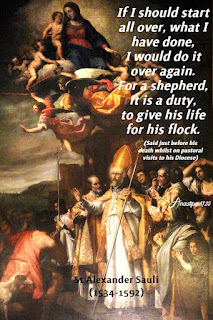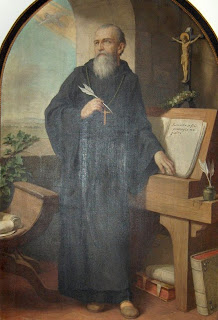Feast Day: December 7
Doctor of the Church
Credit: Photo from https://www.catholicnewsagency.com/saint/st-ambrose-76
Biography:
Saint Ambrose, also known as Ambrose of Milan, was a prominent bishop and theologian in the early Christian Church. He was born around 340 AD into a Roman Christian family. His father was the praetorian prefect of Gaul.
He received a classical education in Rome and embarked on a career in law.
In 374 AD, he was unexpectedly chosen as the Bishop of Milan, despite not being baptized or ordained. He quickly underwent baptism and ordination, and within a week, he was consecrated as bishop.
Ambrose became known for his eloquence in preaching and his defense of orthodoxy against heresy, particularly Arianism.
He played a significant role in the conversion of Augustine of Hippo, one of the most influential theologians in Christian history.
Ambrose was also a prolific writer, producing numerous theological works, letters, and hymns.
He died on April 4, 397 AD.
Patronage:
Saint Ambrose is the patron saint of Milan, beekeepers, candlemakers, and learning.
Prayer to St. Ambrose:
"O loving God, who made Saint Ambrose
a teacher of the Catholic faith
and a model of apostolic courage,
raise up in your Church men and women
after your own heart to govern her
with courage and wisdom.
Through our Lord Jesus Christ, your Son,
who lives and reigns with you
in the unity of the Holy Spirit,
one God, for ever and ever. Amen."
Reflection:
Saint Ambrose's life offers many lessons and inspirations. His sudden rise to the episcopacy demonstrates divine providence and the importance of being open to God's calling, even if it diverges from one's plans. His eloquence in preaching and defense of orthodoxy against heresy underscores the significance of steadfast faith and theological clarity in the face of challenges.
Additionally, his influence on Augustine highlights the power of mentorship and the transformative potential of spiritual guidance. Ambrose's commitment to learning and theological scholarship serves as a reminder of the importance of intellectual engagement in the service of the Church. Overall, Saint Ambrose's life exemplifies dedication to the Gospel, courage in defending the faith, and a profound impact on Christian theology and spirituality.














